Legal Analysis of Contract Law: Case Study of Cafe and Avinash
VerifiedAdded on 2023/01/19
|7
|2464
|29
Report
AI Summary
This report provides a comprehensive analysis of a contract law case involving a cafe and a customer, Avinash. It examines the formation of an implied contract, the elements required for a valid and enforceable contract (offer, acceptance, consideration, intention, and capacity), and the potential breach of contract. The analysis delves into consumer protection laws, specifically addressing the duty of care owed by the cafe to its customers, referencing the Competition and Consumer Act 2010 and common law precedents like Donoghue v. Stevenson. The report also explores the distinction between express and implied terms in a contract, citing relevant cases like Marks & Spencer plc v. BNP Paribas and Attorney General of Belize v. Belize Telcome. Ultimately, the report concludes that Avinash has grounds for legal action against the cafe due to a breach of contract and a failure to exercise the required duty of care. The report incorporates various legal concepts, case laws and legislation to support its arguments.
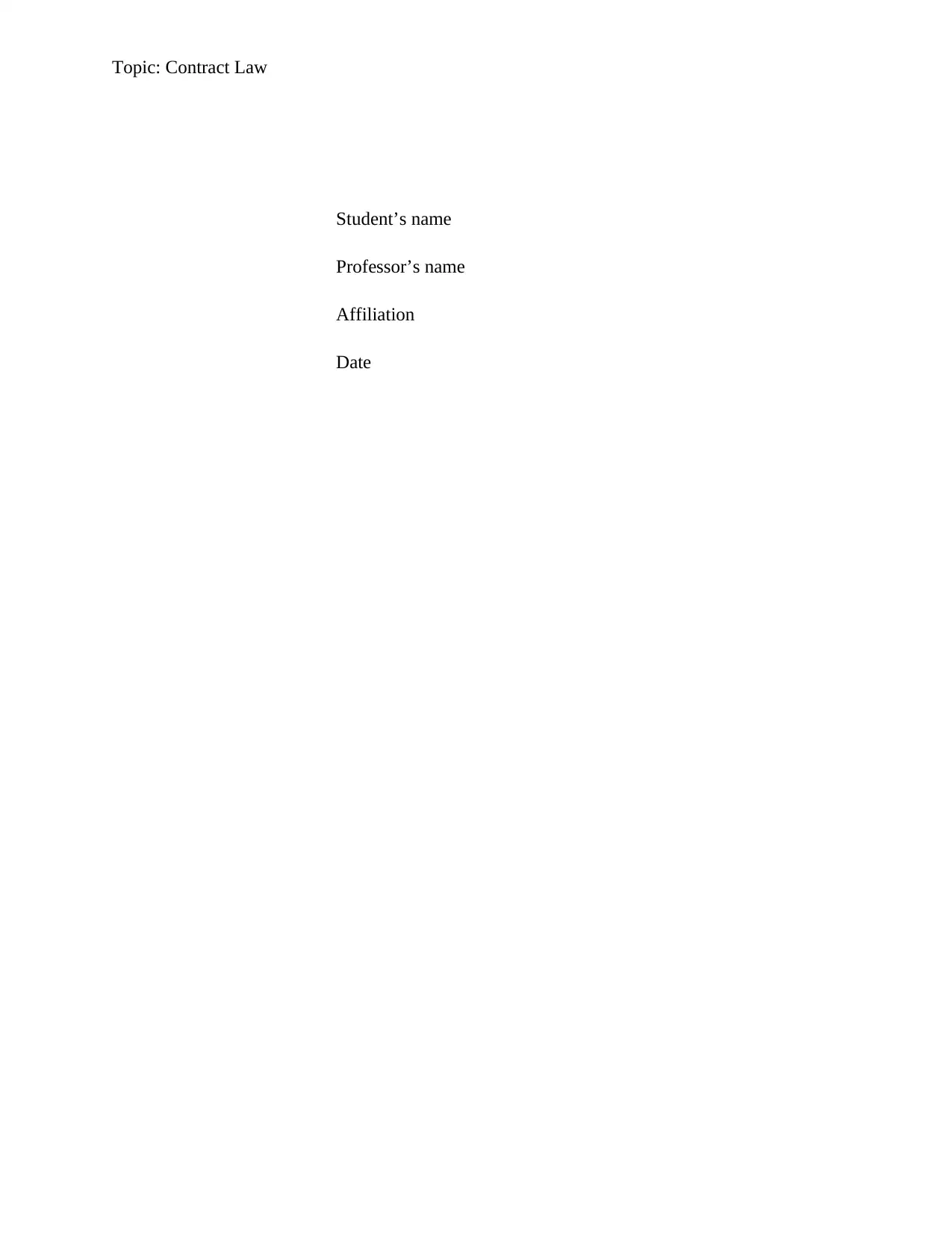
Topic: Contract Law
Student’s name
Professor’s name
Affiliation
Date
Student’s name
Professor’s name
Affiliation
Date
Paraphrase This Document
Need a fresh take? Get an instant paraphrase of this document with our AI Paraphraser
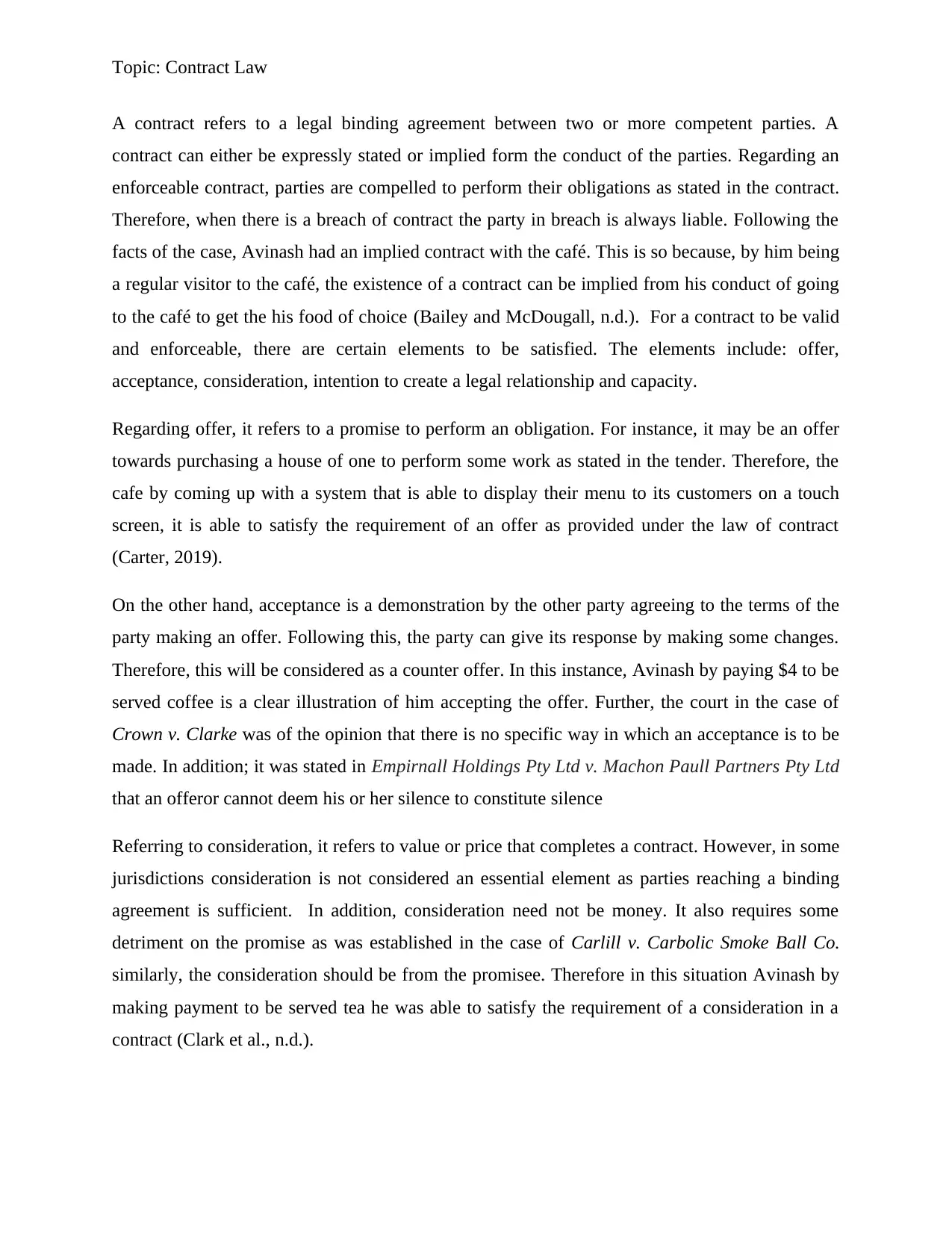
Topic: Contract Law
A contract refers to a legal binding agreement between two or more competent parties. A
contract can either be expressly stated or implied form the conduct of the parties. Regarding an
enforceable contract, parties are compelled to perform their obligations as stated in the contract.
Therefore, when there is a breach of contract the party in breach is always liable. Following the
facts of the case, Avinash had an implied contract with the café. This is so because, by him being
a regular visitor to the café, the existence of a contract can be implied from his conduct of going
to the café to get the his food of choice (Bailey and McDougall, n.d.). For a contract to be valid
and enforceable, there are certain elements to be satisfied. The elements include: offer,
acceptance, consideration, intention to create a legal relationship and capacity.
Regarding offer, it refers to a promise to perform an obligation. For instance, it may be an offer
towards purchasing a house of one to perform some work as stated in the tender. Therefore, the
cafe by coming up with a system that is able to display their menu to its customers on a touch
screen, it is able to satisfy the requirement of an offer as provided under the law of contract
(Carter, 2019).
On the other hand, acceptance is a demonstration by the other party agreeing to the terms of the
party making an offer. Following this, the party can give its response by making some changes.
Therefore, this will be considered as a counter offer. In this instance, Avinash by paying $4 to be
served coffee is a clear illustration of him accepting the offer. Further, the court in the case of
Crown v. Clarke was of the opinion that there is no specific way in which an acceptance is to be
made. In addition; it was stated in Empirnall Holdings Pty Ltd v. Machon Paull Partners Pty Ltd
that an offeror cannot deem his or her silence to constitute silence
Referring to consideration, it refers to value or price that completes a contract. However, in some
jurisdictions consideration is not considered an essential element as parties reaching a binding
agreement is sufficient. In addition, consideration need not be money. It also requires some
detriment on the promise as was established in the case of Carlill v. Carbolic Smoke Ball Co.
similarly, the consideration should be from the promisee. Therefore in this situation Avinash by
making payment to be served tea he was able to satisfy the requirement of a consideration in a
contract (Clark et al., n.d.).
A contract refers to a legal binding agreement between two or more competent parties. A
contract can either be expressly stated or implied form the conduct of the parties. Regarding an
enforceable contract, parties are compelled to perform their obligations as stated in the contract.
Therefore, when there is a breach of contract the party in breach is always liable. Following the
facts of the case, Avinash had an implied contract with the café. This is so because, by him being
a regular visitor to the café, the existence of a contract can be implied from his conduct of going
to the café to get the his food of choice (Bailey and McDougall, n.d.). For a contract to be valid
and enforceable, there are certain elements to be satisfied. The elements include: offer,
acceptance, consideration, intention to create a legal relationship and capacity.
Regarding offer, it refers to a promise to perform an obligation. For instance, it may be an offer
towards purchasing a house of one to perform some work as stated in the tender. Therefore, the
cafe by coming up with a system that is able to display their menu to its customers on a touch
screen, it is able to satisfy the requirement of an offer as provided under the law of contract
(Carter, 2019).
On the other hand, acceptance is a demonstration by the other party agreeing to the terms of the
party making an offer. Following this, the party can give its response by making some changes.
Therefore, this will be considered as a counter offer. In this instance, Avinash by paying $4 to be
served coffee is a clear illustration of him accepting the offer. Further, the court in the case of
Crown v. Clarke was of the opinion that there is no specific way in which an acceptance is to be
made. In addition; it was stated in Empirnall Holdings Pty Ltd v. Machon Paull Partners Pty Ltd
that an offeror cannot deem his or her silence to constitute silence
Referring to consideration, it refers to value or price that completes a contract. However, in some
jurisdictions consideration is not considered an essential element as parties reaching a binding
agreement is sufficient. In addition, consideration need not be money. It also requires some
detriment on the promise as was established in the case of Carlill v. Carbolic Smoke Ball Co.
similarly, the consideration should be from the promisee. Therefore in this situation Avinash by
making payment to be served tea he was able to satisfy the requirement of a consideration in a
contract (Clark et al., n.d.).
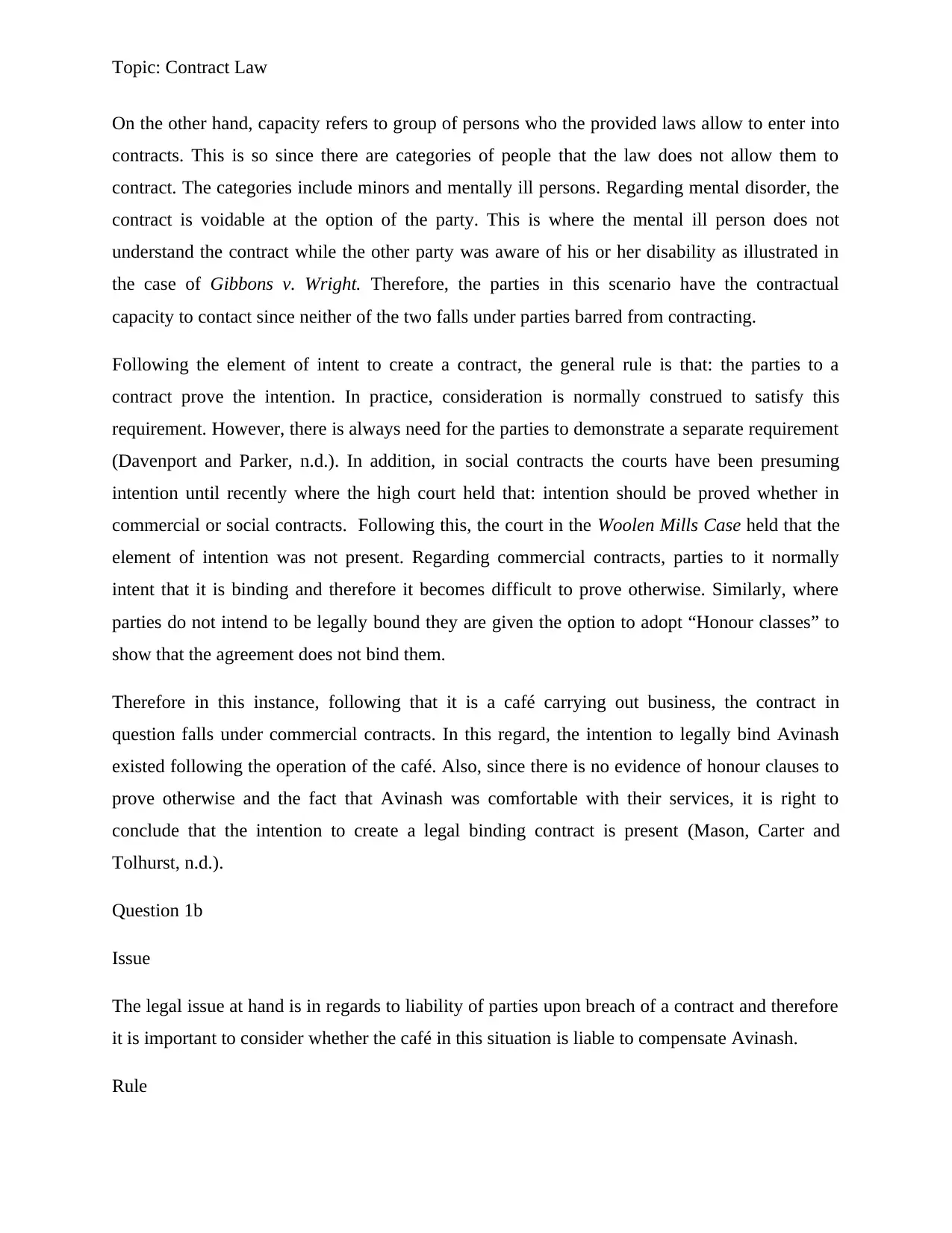
Topic: Contract Law
On the other hand, capacity refers to group of persons who the provided laws allow to enter into
contracts. This is so since there are categories of people that the law does not allow them to
contract. The categories include minors and mentally ill persons. Regarding mental disorder, the
contract is voidable at the option of the party. This is where the mental ill person does not
understand the contract while the other party was aware of his or her disability as illustrated in
the case of Gibbons v. Wright. Therefore, the parties in this scenario have the contractual
capacity to contact since neither of the two falls under parties barred from contracting.
Following the element of intent to create a contract, the general rule is that: the parties to a
contract prove the intention. In practice, consideration is normally construed to satisfy this
requirement. However, there is always need for the parties to demonstrate a separate requirement
(Davenport and Parker, n.d.). In addition, in social contracts the courts have been presuming
intention until recently where the high court held that: intention should be proved whether in
commercial or social contracts. Following this, the court in the Woolen Mills Case held that the
element of intention was not present. Regarding commercial contracts, parties to it normally
intent that it is binding and therefore it becomes difficult to prove otherwise. Similarly, where
parties do not intend to be legally bound they are given the option to adopt “Honour classes” to
show that the agreement does not bind them.
Therefore in this instance, following that it is a café carrying out business, the contract in
question falls under commercial contracts. In this regard, the intention to legally bind Avinash
existed following the operation of the café. Also, since there is no evidence of honour clauses to
prove otherwise and the fact that Avinash was comfortable with their services, it is right to
conclude that the intention to create a legal binding contract is present (Mason, Carter and
Tolhurst, n.d.).
Question 1b
Issue
The legal issue at hand is in regards to liability of parties upon breach of a contract and therefore
it is important to consider whether the café in this situation is liable to compensate Avinash.
Rule
On the other hand, capacity refers to group of persons who the provided laws allow to enter into
contracts. This is so since there are categories of people that the law does not allow them to
contract. The categories include minors and mentally ill persons. Regarding mental disorder, the
contract is voidable at the option of the party. This is where the mental ill person does not
understand the contract while the other party was aware of his or her disability as illustrated in
the case of Gibbons v. Wright. Therefore, the parties in this scenario have the contractual
capacity to contact since neither of the two falls under parties barred from contracting.
Following the element of intent to create a contract, the general rule is that: the parties to a
contract prove the intention. In practice, consideration is normally construed to satisfy this
requirement. However, there is always need for the parties to demonstrate a separate requirement
(Davenport and Parker, n.d.). In addition, in social contracts the courts have been presuming
intention until recently where the high court held that: intention should be proved whether in
commercial or social contracts. Following this, the court in the Woolen Mills Case held that the
element of intention was not present. Regarding commercial contracts, parties to it normally
intent that it is binding and therefore it becomes difficult to prove otherwise. Similarly, where
parties do not intend to be legally bound they are given the option to adopt “Honour classes” to
show that the agreement does not bind them.
Therefore in this instance, following that it is a café carrying out business, the contract in
question falls under commercial contracts. In this regard, the intention to legally bind Avinash
existed following the operation of the café. Also, since there is no evidence of honour clauses to
prove otherwise and the fact that Avinash was comfortable with their services, it is right to
conclude that the intention to create a legal binding contract is present (Mason, Carter and
Tolhurst, n.d.).
Question 1b
Issue
The legal issue at hand is in regards to liability of parties upon breach of a contract and therefore
it is important to consider whether the café in this situation is liable to compensate Avinash.
Rule
⊘ This is a preview!⊘
Do you want full access?
Subscribe today to unlock all pages.

Trusted by 1+ million students worldwide
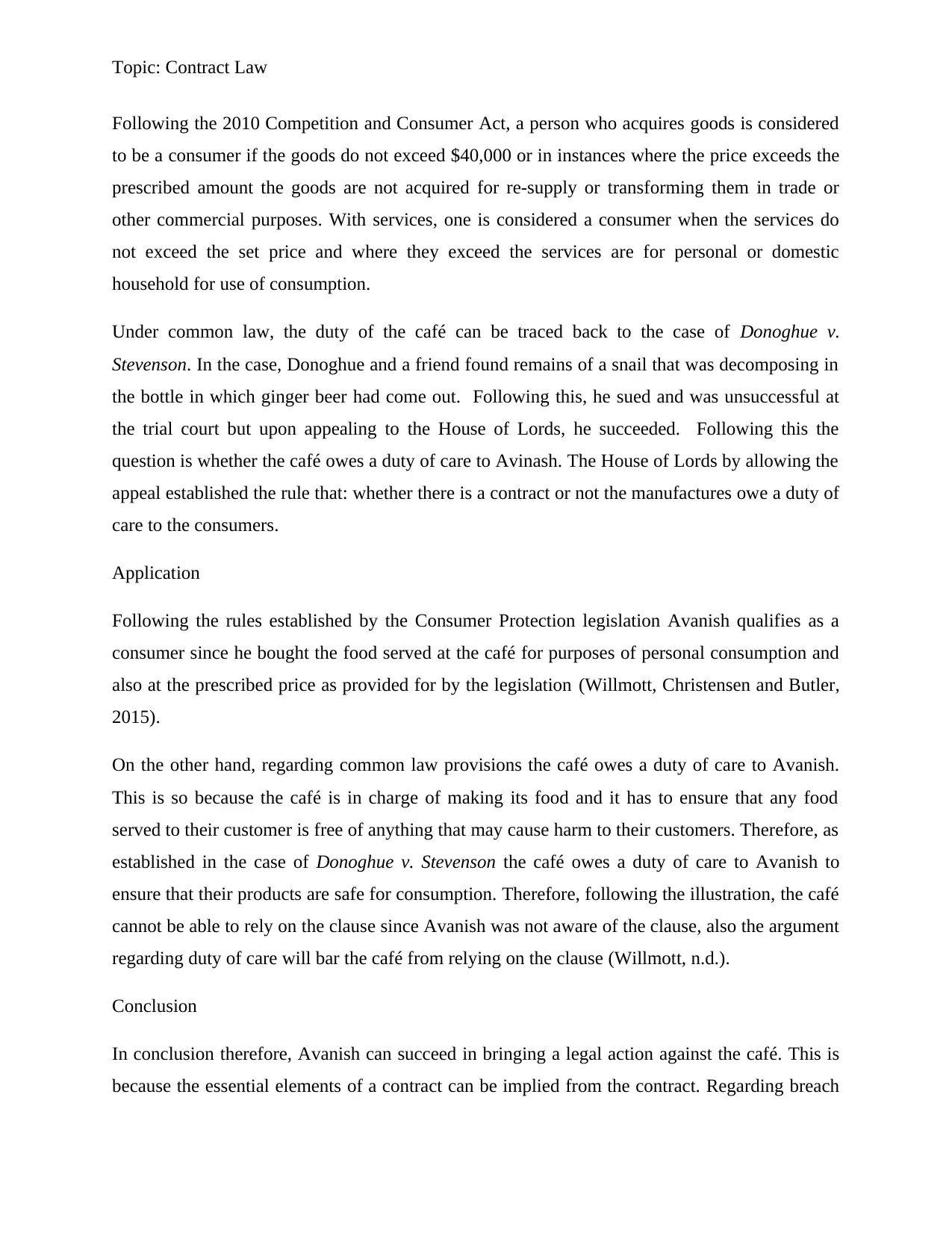
Topic: Contract Law
Following the 2010 Competition and Consumer Act, a person who acquires goods is considered
to be a consumer if the goods do not exceed $40,000 or in instances where the price exceeds the
prescribed amount the goods are not acquired for re-supply or transforming them in trade or
other commercial purposes. With services, one is considered a consumer when the services do
not exceed the set price and where they exceed the services are for personal or domestic
household for use of consumption.
Under common law, the duty of the café can be traced back to the case of Donoghue v.
Stevenson. In the case, Donoghue and a friend found remains of a snail that was decomposing in
the bottle in which ginger beer had come out. Following this, he sued and was unsuccessful at
the trial court but upon appealing to the House of Lords, he succeeded. Following this the
question is whether the café owes a duty of care to Avinash. The House of Lords by allowing the
appeal established the rule that: whether there is a contract or not the manufactures owe a duty of
care to the consumers.
Application
Following the rules established by the Consumer Protection legislation Avanish qualifies as a
consumer since he bought the food served at the café for purposes of personal consumption and
also at the prescribed price as provided for by the legislation (Willmott, Christensen and Butler,
2015).
On the other hand, regarding common law provisions the café owes a duty of care to Avanish.
This is so because the café is in charge of making its food and it has to ensure that any food
served to their customer is free of anything that may cause harm to their customers. Therefore, as
established in the case of Donoghue v. Stevenson the café owes a duty of care to Avanish to
ensure that their products are safe for consumption. Therefore, following the illustration, the café
cannot be able to rely on the clause since Avanish was not aware of the clause, also the argument
regarding duty of care will bar the café from relying on the clause (Willmott, n.d.).
Conclusion
In conclusion therefore, Avanish can succeed in bringing a legal action against the café. This is
because the essential elements of a contract can be implied from the contract. Regarding breach
Following the 2010 Competition and Consumer Act, a person who acquires goods is considered
to be a consumer if the goods do not exceed $40,000 or in instances where the price exceeds the
prescribed amount the goods are not acquired for re-supply or transforming them in trade or
other commercial purposes. With services, one is considered a consumer when the services do
not exceed the set price and where they exceed the services are for personal or domestic
household for use of consumption.
Under common law, the duty of the café can be traced back to the case of Donoghue v.
Stevenson. In the case, Donoghue and a friend found remains of a snail that was decomposing in
the bottle in which ginger beer had come out. Following this, he sued and was unsuccessful at
the trial court but upon appealing to the House of Lords, he succeeded. Following this the
question is whether the café owes a duty of care to Avinash. The House of Lords by allowing the
appeal established the rule that: whether there is a contract or not the manufactures owe a duty of
care to the consumers.
Application
Following the rules established by the Consumer Protection legislation Avanish qualifies as a
consumer since he bought the food served at the café for purposes of personal consumption and
also at the prescribed price as provided for by the legislation (Willmott, Christensen and Butler,
2015).
On the other hand, regarding common law provisions the café owes a duty of care to Avanish.
This is so because the café is in charge of making its food and it has to ensure that any food
served to their customer is free of anything that may cause harm to their customers. Therefore, as
established in the case of Donoghue v. Stevenson the café owes a duty of care to Avanish to
ensure that their products are safe for consumption. Therefore, following the illustration, the café
cannot be able to rely on the clause since Avanish was not aware of the clause, also the argument
regarding duty of care will bar the café from relying on the clause (Willmott, n.d.).
Conclusion
In conclusion therefore, Avanish can succeed in bringing a legal action against the café. This is
because the essential elements of a contract can be implied from the contract. Regarding breach
Paraphrase This Document
Need a fresh take? Get an instant paraphrase of this document with our AI Paraphraser
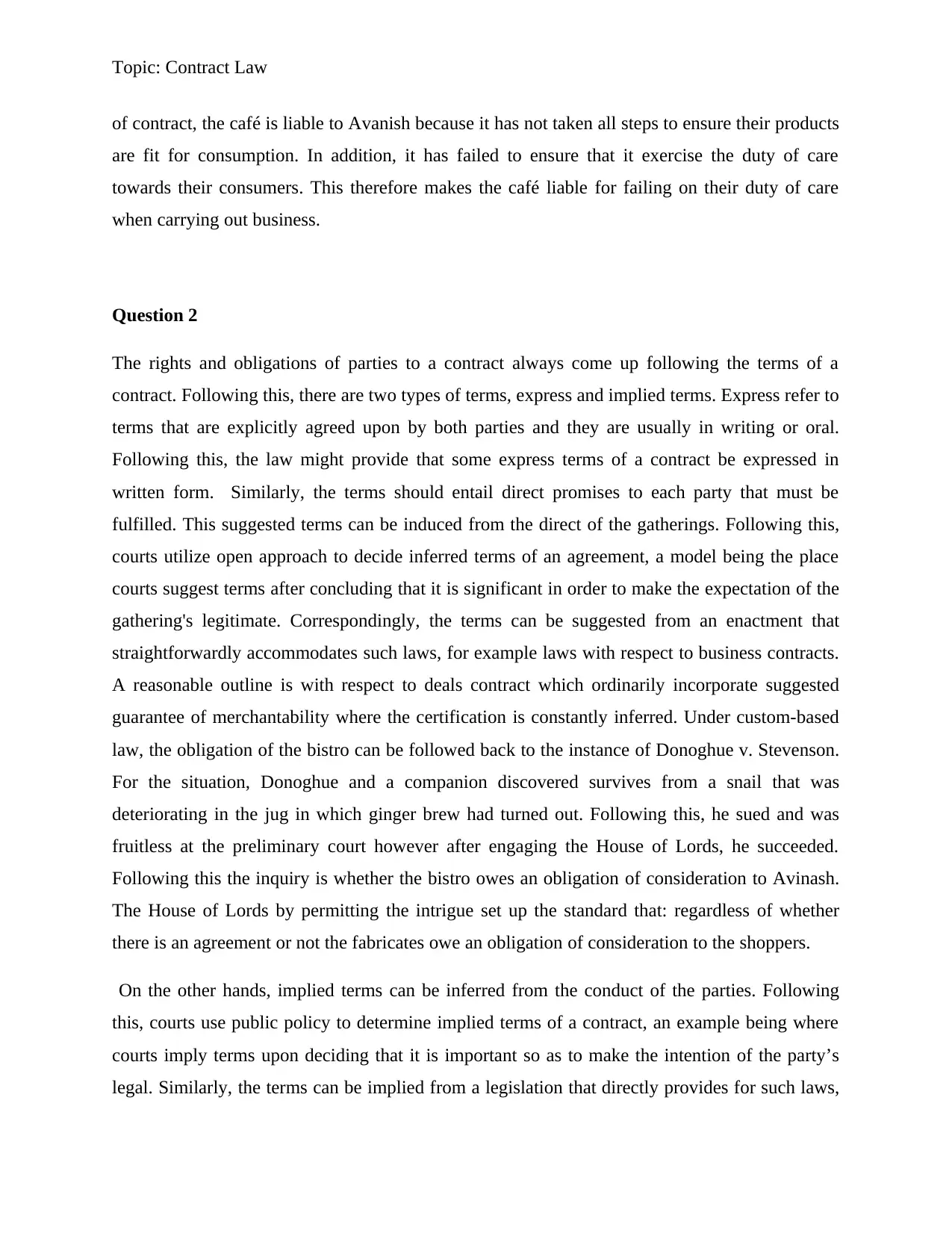
Topic: Contract Law
of contract, the café is liable to Avanish because it has not taken all steps to ensure their products
are fit for consumption. In addition, it has failed to ensure that it exercise the duty of care
towards their consumers. This therefore makes the café liable for failing on their duty of care
when carrying out business.
Question 2
The rights and obligations of parties to a contract always come up following the terms of a
contract. Following this, there are two types of terms, express and implied terms. Express refer to
terms that are explicitly agreed upon by both parties and they are usually in writing or oral.
Following this, the law might provide that some express terms of a contract be expressed in
written form. Similarly, the terms should entail direct promises to each party that must be
fulfilled. This suggested terms can be induced from the direct of the gatherings. Following this,
courts utilize open approach to decide inferred terms of an agreement, a model being the place
courts suggest terms after concluding that it is significant in order to make the expectation of the
gathering's legitimate. Correspondingly, the terms can be suggested from an enactment that
straightforwardly accommodates such laws, for example laws with respect to business contracts.
A reasonable outline is with respect to deals contract which ordinarily incorporate suggested
guarantee of merchantability where the certification is constantly inferred. Under custom-based
law, the obligation of the bistro can be followed back to the instance of Donoghue v. Stevenson.
For the situation, Donoghue and a companion discovered survives from a snail that was
deteriorating in the jug in which ginger brew had turned out. Following this, he sued and was
fruitless at the preliminary court however after engaging the House of Lords, he succeeded.
Following this the inquiry is whether the bistro owes an obligation of consideration to Avinash.
The House of Lords by permitting the intrigue set up the standard that: regardless of whether
there is an agreement or not the fabricates owe an obligation of consideration to the shoppers.
On the other hands, implied terms can be inferred from the conduct of the parties. Following
this, courts use public policy to determine implied terms of a contract, an example being where
courts imply terms upon deciding that it is important so as to make the intention of the party’s
legal. Similarly, the terms can be implied from a legislation that directly provides for such laws,
of contract, the café is liable to Avanish because it has not taken all steps to ensure their products
are fit for consumption. In addition, it has failed to ensure that it exercise the duty of care
towards their consumers. This therefore makes the café liable for failing on their duty of care
when carrying out business.
Question 2
The rights and obligations of parties to a contract always come up following the terms of a
contract. Following this, there are two types of terms, express and implied terms. Express refer to
terms that are explicitly agreed upon by both parties and they are usually in writing or oral.
Following this, the law might provide that some express terms of a contract be expressed in
written form. Similarly, the terms should entail direct promises to each party that must be
fulfilled. This suggested terms can be induced from the direct of the gatherings. Following this,
courts utilize open approach to decide inferred terms of an agreement, a model being the place
courts suggest terms after concluding that it is significant in order to make the expectation of the
gathering's legitimate. Correspondingly, the terms can be suggested from an enactment that
straightforwardly accommodates such laws, for example laws with respect to business contracts.
A reasonable outline is with respect to deals contract which ordinarily incorporate suggested
guarantee of merchantability where the certification is constantly inferred. Under custom-based
law, the obligation of the bistro can be followed back to the instance of Donoghue v. Stevenson.
For the situation, Donoghue and a companion discovered survives from a snail that was
deteriorating in the jug in which ginger brew had turned out. Following this, he sued and was
fruitless at the preliminary court however after engaging the House of Lords, he succeeded.
Following this the inquiry is whether the bistro owes an obligation of consideration to Avinash.
The House of Lords by permitting the intrigue set up the standard that: regardless of whether
there is an agreement or not the fabricates owe an obligation of consideration to the shoppers.
On the other hands, implied terms can be inferred from the conduct of the parties. Following
this, courts use public policy to determine implied terms of a contract, an example being where
courts imply terms upon deciding that it is important so as to make the intention of the party’s
legal. Similarly, the terms can be implied from a legislation that directly provides for such laws,
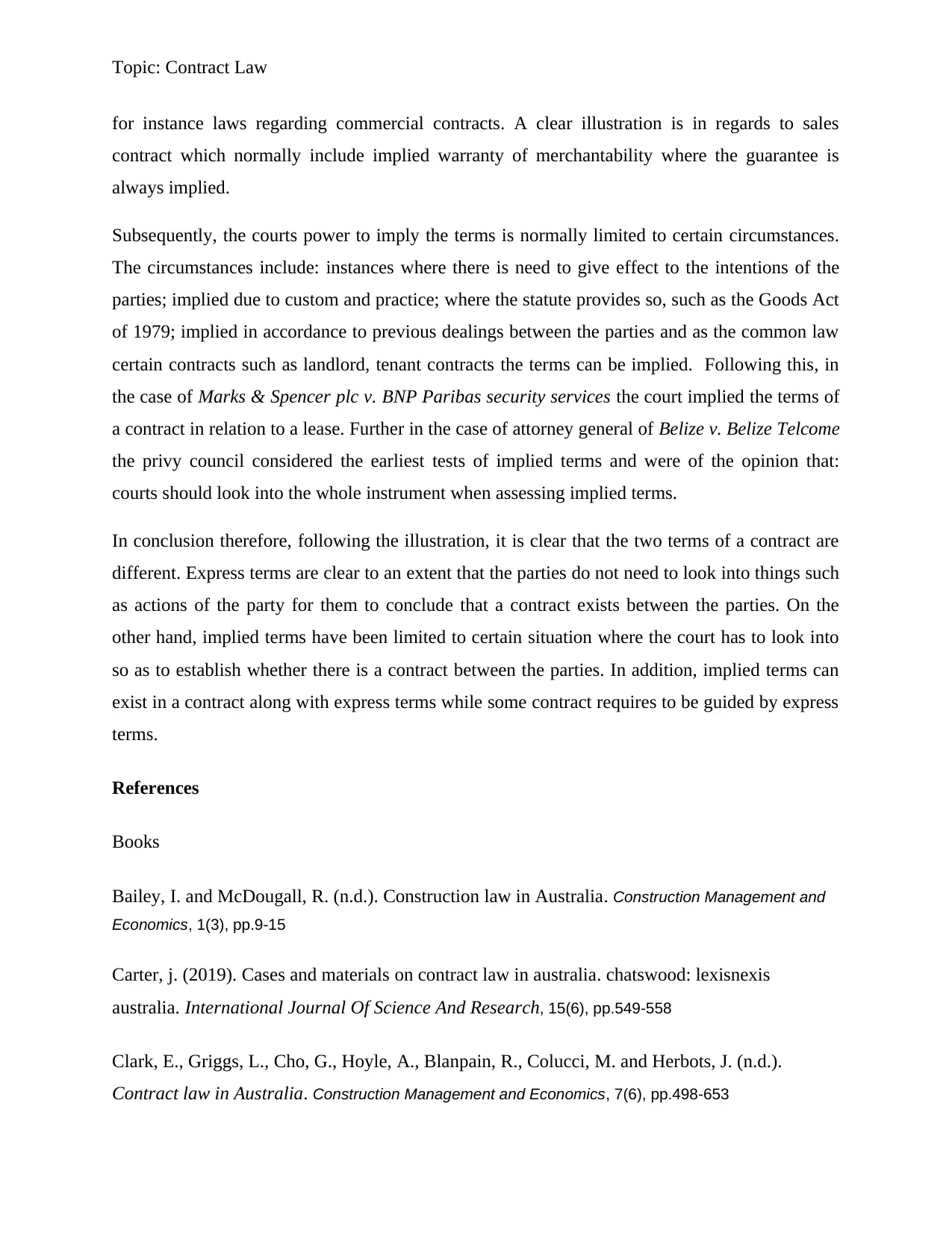
Topic: Contract Law
for instance laws regarding commercial contracts. A clear illustration is in regards to sales
contract which normally include implied warranty of merchantability where the guarantee is
always implied.
Subsequently, the courts power to imply the terms is normally limited to certain circumstances.
The circumstances include: instances where there is need to give effect to the intentions of the
parties; implied due to custom and practice; where the statute provides so, such as the Goods Act
of 1979; implied in accordance to previous dealings between the parties and as the common law
certain contracts such as landlord, tenant contracts the terms can be implied. Following this, in
the case of Marks & Spencer plc v. BNP Paribas security services the court implied the terms of
a contract in relation to a lease. Further in the case of attorney general of Belize v. Belize Telcome
the privy council considered the earliest tests of implied terms and were of the opinion that:
courts should look into the whole instrument when assessing implied terms.
In conclusion therefore, following the illustration, it is clear that the two terms of a contract are
different. Express terms are clear to an extent that the parties do not need to look into things such
as actions of the party for them to conclude that a contract exists between the parties. On the
other hand, implied terms have been limited to certain situation where the court has to look into
so as to establish whether there is a contract between the parties. In addition, implied terms can
exist in a contract along with express terms while some contract requires to be guided by express
terms.
References
Books
Bailey, I. and McDougall, R. (n.d.). Construction law in Australia. Construction Management and
Economics, 1(3), pp.9-15
Carter, j. (2019). Cases and materials on contract law in australia. chatswood: lexisnexis
australia. International Journal Of Science And Research, 15(6), pp.549-558
Clark, E., Griggs, L., Cho, G., Hoyle, A., Blanpain, R., Colucci, M. and Herbots, J. (n.d.).
Contract law in Australia. Construction Management and Economics, 7(6), pp.498-653
for instance laws regarding commercial contracts. A clear illustration is in regards to sales
contract which normally include implied warranty of merchantability where the guarantee is
always implied.
Subsequently, the courts power to imply the terms is normally limited to certain circumstances.
The circumstances include: instances where there is need to give effect to the intentions of the
parties; implied due to custom and practice; where the statute provides so, such as the Goods Act
of 1979; implied in accordance to previous dealings between the parties and as the common law
certain contracts such as landlord, tenant contracts the terms can be implied. Following this, in
the case of Marks & Spencer plc v. BNP Paribas security services the court implied the terms of
a contract in relation to a lease. Further in the case of attorney general of Belize v. Belize Telcome
the privy council considered the earliest tests of implied terms and were of the opinion that:
courts should look into the whole instrument when assessing implied terms.
In conclusion therefore, following the illustration, it is clear that the two terms of a contract are
different. Express terms are clear to an extent that the parties do not need to look into things such
as actions of the party for them to conclude that a contract exists between the parties. On the
other hand, implied terms have been limited to certain situation where the court has to look into
so as to establish whether there is a contract between the parties. In addition, implied terms can
exist in a contract along with express terms while some contract requires to be guided by express
terms.
References
Books
Bailey, I. and McDougall, R. (n.d.). Construction law in Australia. Construction Management and
Economics, 1(3), pp.9-15
Carter, j. (2019). Cases and materials on contract law in australia. chatswood: lexisnexis
australia. International Journal Of Science And Research, 15(6), pp.549-558
Clark, E., Griggs, L., Cho, G., Hoyle, A., Blanpain, R., Colucci, M. and Herbots, J. (n.d.).
Contract law in Australia. Construction Management and Economics, 7(6), pp.498-653
⊘ This is a preview!⊘
Do you want full access?
Subscribe today to unlock all pages.

Trusted by 1+ million students worldwide
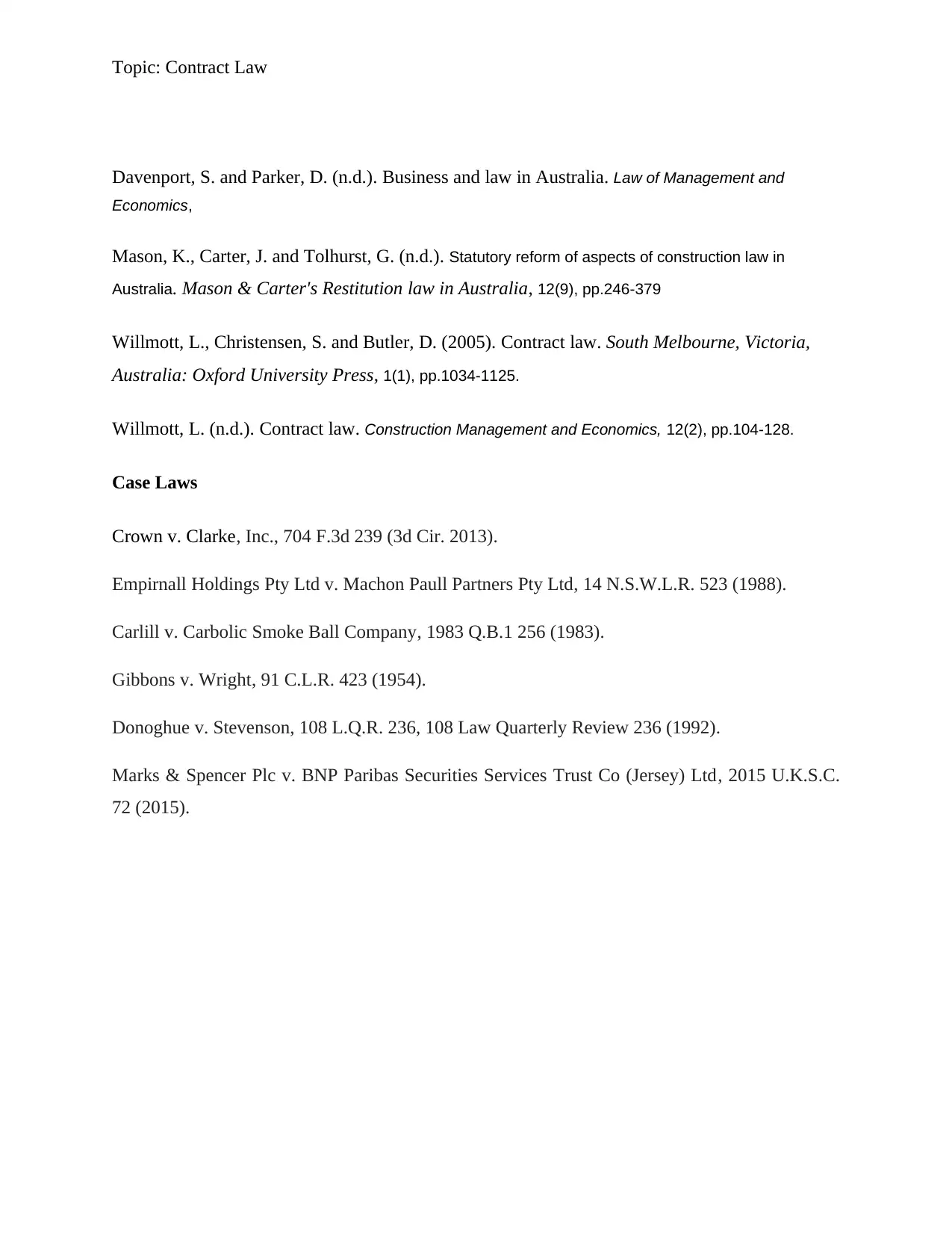
Topic: Contract Law
Davenport, S. and Parker, D. (n.d.). Business and law in Australia. Law of Management and
Economics,
Mason, K., Carter, J. and Tolhurst, G. (n.d.). Statutory reform of aspects of construction law in
Australia. Mason & Carter's Restitution law in Australia, 12(9), pp.246-379
Willmott, L., Christensen, S. and Butler, D. (2005). Contract law. South Melbourne, Victoria,
Australia: Oxford University Press, 1(1), pp.1034-1125.
Willmott, L. (n.d.). Contract law. Construction Management and Economics, 12(2), pp.104-128.
Case Laws
Crown v. Clarke, Inc., 704 F.3d 239 (3d Cir. 2013).
Empirnall Holdings Pty Ltd v. Machon Paull Partners Pty Ltd, 14 N.S.W.L.R. 523 (1988).
Carlill v. Carbolic Smoke Ball Company, 1983 Q.B.1 256 (1983).
Gibbons v. Wright, 91 C.L.R. 423 (1954).
Donoghue v. Stevenson, 108 L.Q.R. 236, 108 Law Quarterly Review 236 (1992).
Marks & Spencer Plc v. BNP Paribas Securities Services Trust Co (Jersey) Ltd, 2015 U.K.S.C.
72 (2015).
Davenport, S. and Parker, D. (n.d.). Business and law in Australia. Law of Management and
Economics,
Mason, K., Carter, J. and Tolhurst, G. (n.d.). Statutory reform of aspects of construction law in
Australia. Mason & Carter's Restitution law in Australia, 12(9), pp.246-379
Willmott, L., Christensen, S. and Butler, D. (2005). Contract law. South Melbourne, Victoria,
Australia: Oxford University Press, 1(1), pp.1034-1125.
Willmott, L. (n.d.). Contract law. Construction Management and Economics, 12(2), pp.104-128.
Case Laws
Crown v. Clarke, Inc., 704 F.3d 239 (3d Cir. 2013).
Empirnall Holdings Pty Ltd v. Machon Paull Partners Pty Ltd, 14 N.S.W.L.R. 523 (1988).
Carlill v. Carbolic Smoke Ball Company, 1983 Q.B.1 256 (1983).
Gibbons v. Wright, 91 C.L.R. 423 (1954).
Donoghue v. Stevenson, 108 L.Q.R. 236, 108 Law Quarterly Review 236 (1992).
Marks & Spencer Plc v. BNP Paribas Securities Services Trust Co (Jersey) Ltd, 2015 U.K.S.C.
72 (2015).
1 out of 7
Related Documents
Your All-in-One AI-Powered Toolkit for Academic Success.
+13062052269
info@desklib.com
Available 24*7 on WhatsApp / Email
![[object Object]](/_next/static/media/star-bottom.7253800d.svg)
Unlock your academic potential
Copyright © 2020–2026 A2Z Services. All Rights Reserved. Developed and managed by ZUCOL.





